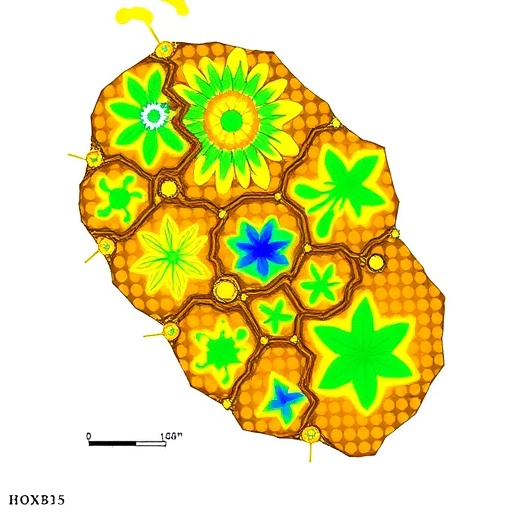In the constantly evolving landscape of cancer genetics, recent research has shone a spotlight on a seldom-discussed variant of the HOXB13 gene, known as X285K, revealing its potential role in the progression of prostate cancer within the French Caribbean population. This groundbreaking cohort study sheds new light on the genetic underpinnings of prostate cancer, particularly among individuals of African descent, whose unique genetic profiles have remained underrepresented in scientific inquiry.
The HOXB13 gene has long been implicated in the heritability of prostate cancer, with certain germline mutations influencing the disease’s onset and aggressiveness. Most prominently, the G84E mutation has been extensively studied and correlated with early-onset prostate cancer in Caucasian populations. However, the X285K variant, prevalent primarily among those of African ancestry, remained elusive in its clinical impact until now. This new investigation aims to bridge that knowledge gap by prospectively analyzing a sizeable cohort from the French Caribbean, an ethnically diverse region with high African lineage representation.
Utilizing rigorous Sanger sequencing techniques, the researchers examined germline DNA from 465 men diagnosed with prostate cancer. Their meticulous approach led to the identification of the X285K variant in five patients, a modest prevalence rate of approximately 1.07%. Despite the seemingly low frequency, the presence of this variant correlated strongly with adverse disease characteristics, marking a potential paradigm shift in understanding prostate cancer’s genetic risks within this demographic.
Intriguingly, all carriers of the X285K variant presented with clinically significant prostate cancer. Among these individuals, three were diagnosed with de novo metastatic disease, suggesting the variant’s association with aggressive tumor biology from the onset. Moreover, the two carriers with localized disease experienced notably early biochemical recurrence, within 22 to 34 months post-treatment, contrasting starkly with the broader cohort’s more favorable recurrence-free survival rate of over 85% at 50 months.
These findings hint at the possibility that the X285K variant might drive a more aggressive clinical course in prostate cancer patients, making it not merely a genetic curiosity but a critical biomarker for risk stratification. Such insights prompt a reconsideration of current genetic screening practices, particularly for patients of African descent who may carry this variant but remain undetected due to the lack of inclusive genetic screening panels.
The study’s implications extend beyond the immediate clinical environment, touching on broader themes of health equity and personalized medicine. African and Afro-descendant populations, including those in the Caribbean, have historically been underrepresented in genomic databases, leading to a gap in tailored medical guidance. By highlighting the prevalence and significance of the HOXB13 X285K variant in these populations, this research underscores the urgency of diversifying genetic studies to ensure equitable healthcare advancements.
Moreover, the potential mechanistic pathways underpinning the X285K variant’s influence on tumor behavior warrant further exploration. HOXB13 functions as a transcription factor critical to the regulation of prostate development and differentiation. Alterations such as the X285K substitution could disrupt normal gene expression patterns, contributing to unchecked cellular proliferation and metastatic potential. Deciphering these molecular consequences could pave the way for targeted therapeutics that specifically mitigate the risks associated with this variant.
Clinicians should consider integrating HOXB13 X285K screening into routine genetic panels for prostate cancer patients, especially those with African heritage or from the Caribbean basin. Early identification of carriers could inform more aggressive monitoring strategies and personalized treatment plans aimed at curbing early metastasis and recurrence, ultimately improving patient outcomes.
While the study’s sample size remains limited, reflecting the rarity of the variant, the consistent association with adverse clinical features in all carriers offers a compelling narrative for its pathogenic significance. Future large-scale, multicentric studies are essential to validate these preliminary findings and to facilitate the inclusion of X285K in global genetic screening frameworks.
This investigation also raises awareness about the broader spectrum of genetic diversity influencing prostate cancer risk. It challenges the predominant focus on variants prevalent in Caucasian populations, advocating for a comprehensive approach that captures the nuanced genetic landscape across ethnic groups.
In conclusion, the identification and characterization of the HOXB13 X285K variant in a French Caribbean prostate cancer cohort offer profound insights into hereditary cancer risks among underserved populations. These findings herald a critical step toward more inclusive genomics research, refined risk assessment models, and tailored clinical interventions for prostate cancer patients worldwide. The continued exploration of this rare variant may unlock novel avenues for combating one of the most common and lethal cancers affecting men globally.
Subject of Research:
The study focuses on the prevalence and clinical implications of the rare HOXB13 X285K germline variant in prostate cancer patients from the French Caribbean, with an emphasis on its association with aggressive disease features and early tumor progression.
Article Title:
Prevalence and clinical significance of the rare HOXB13 X285K variant in a French Caribbean prostate cancer cohort
Article References:
Rose-Dite-Modestine, J., Vallard, A., Loger, JS. et al. Prevalence and clinical significance of the rare HOXB13 X285K variant in a French Caribbean prostate cancer cohort. BMC Cancer 25, 1703 (2025). https://doi.org/10.1186/s12885-025-15155-z
Image Credits: Scienmag.com
DOI: 04 November 2025
Tags: African ancestry prostate cancerCaribbean prostate cancer geneticscohort study on prostate cancerethnic diversity in cancer researchgenetic underpinnings of cancergermline mutations in prostate cancerheritability of prostate cancerHOXB13 gene variantrare genetic variants in cancerSanger sequencing in geneticsunderrepresented populations in geneticsX285K prostate cancer mutation





